Abstract
Typical and atypical Campylobacter strains were isolated from the colons of cattle and swine by techniques that enabled the selective pressures of antibiotics to be avoided. Some cephalothin-susceptible strains and a strain with an indeterminate hippurate reaction were classified as Campylobacter coli by DNA homology testing. Tetracycline-resistant isolates were obtained from animals with no recorded exposure to antibiotics. A selection of 12 C. coli and 6 C. jejuni strains was used to determine the ability of fresh isolates to grow on a range of selective media. C. coli isolates were inhibited more than C. jejuni on selective media containing antibiotics. The least inhibitory media were Skirrow medium (M. B. Skirrow, Br. Med. J. 2:9-11, 1977) and the charcoal-based media developed by Hutchinson and Bolton (D. N. Hutchinson and F. J. Bolton, J. Clin. Pathol. 37:956-957, 1984) and Karmali et al. (M. A. Karmali, A. E. Simon, M. Roscoe, P. C. Fleming, S. S. Smith, and J. Lane, J. Clin. Microbiol. 23:456-459, 1986). The plasmid contents of the isolates did not appear to be related to their sensitivity to growth on selective (antibiotic-containing) media. The study indicates that selective media used to detect Campylobacter spp. could select against the isolation of C. coli.
Full text
PDF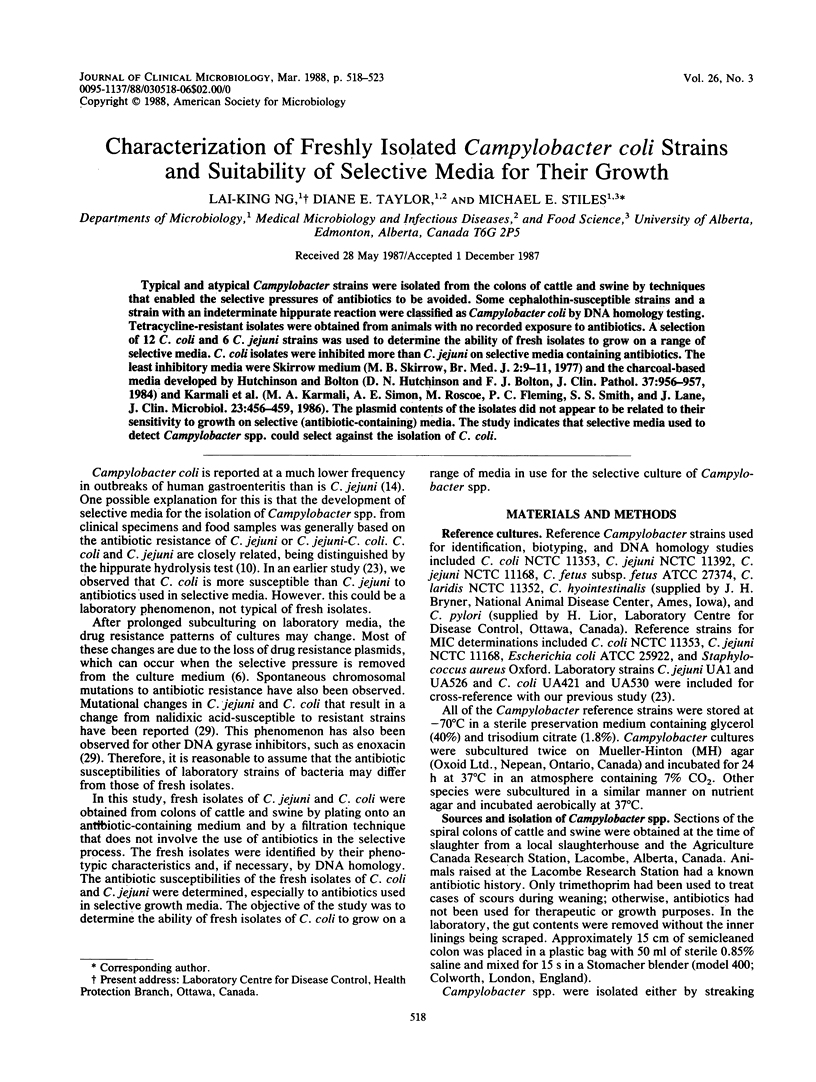
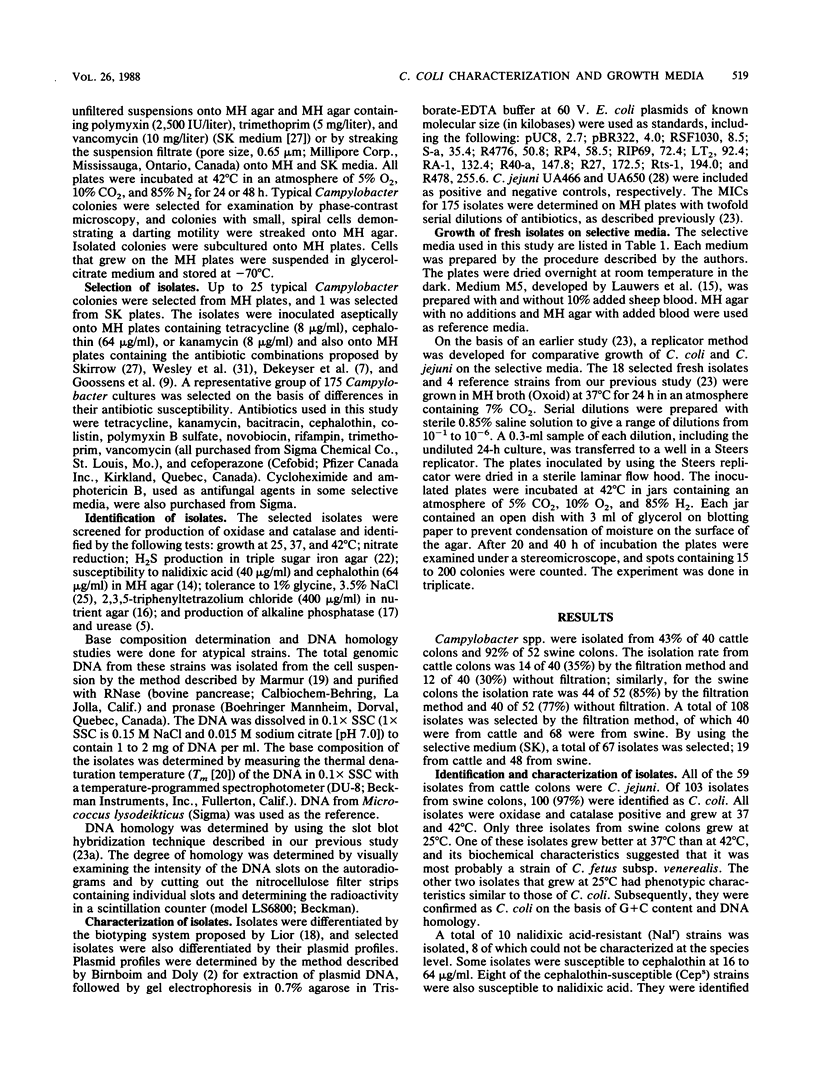
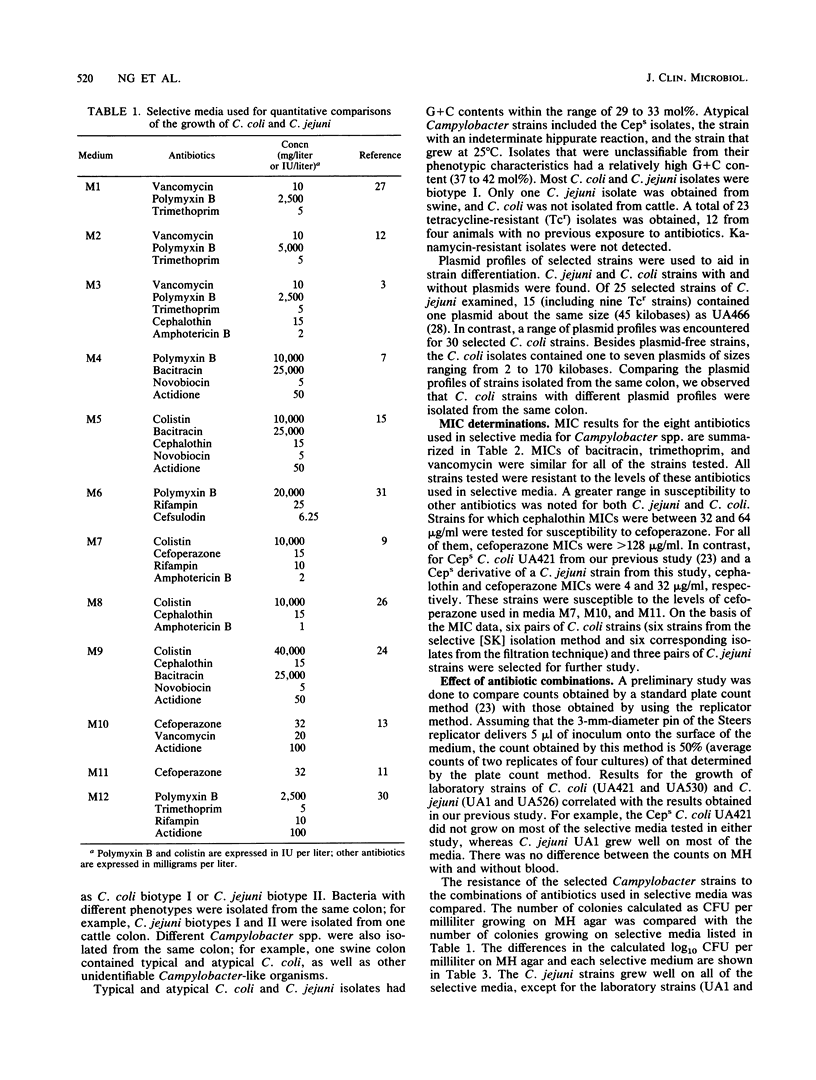
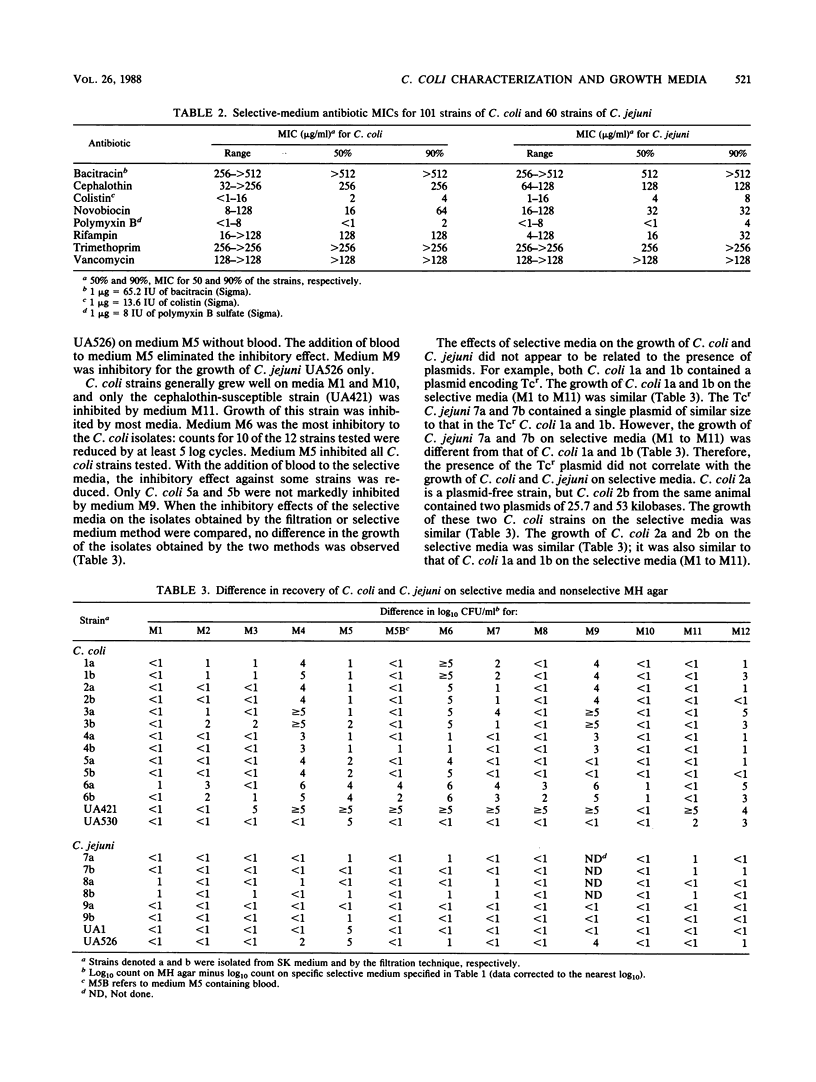
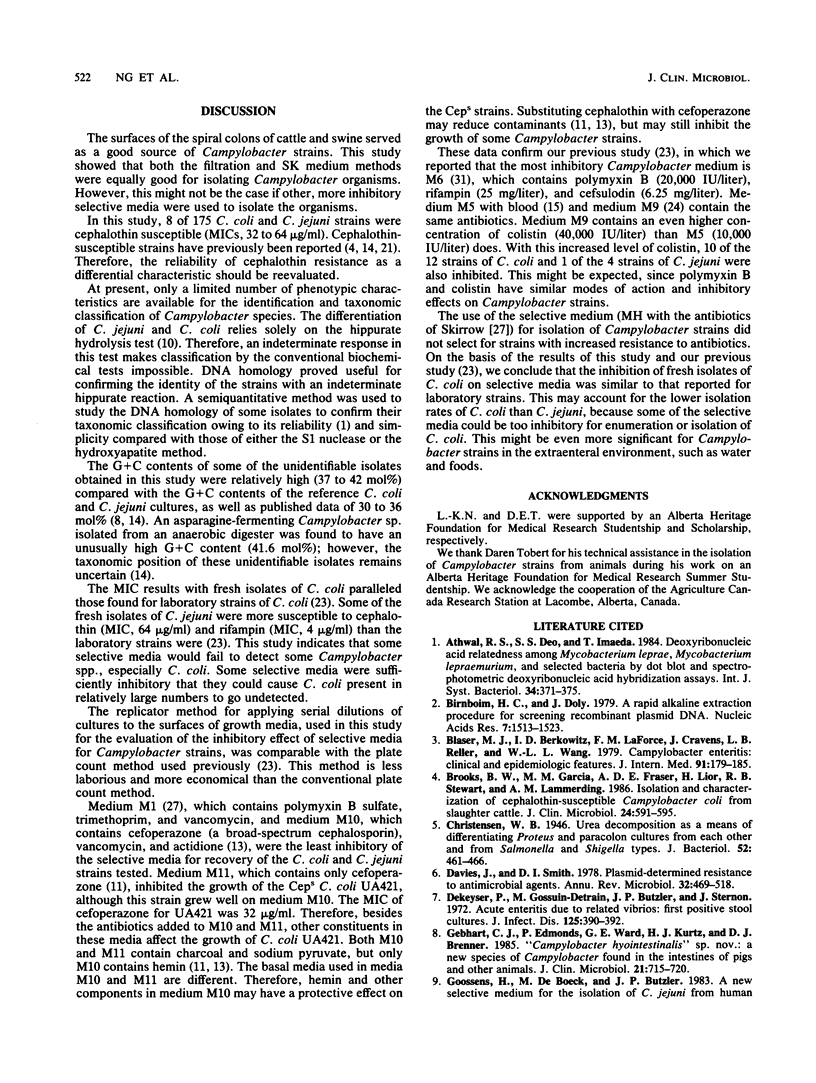
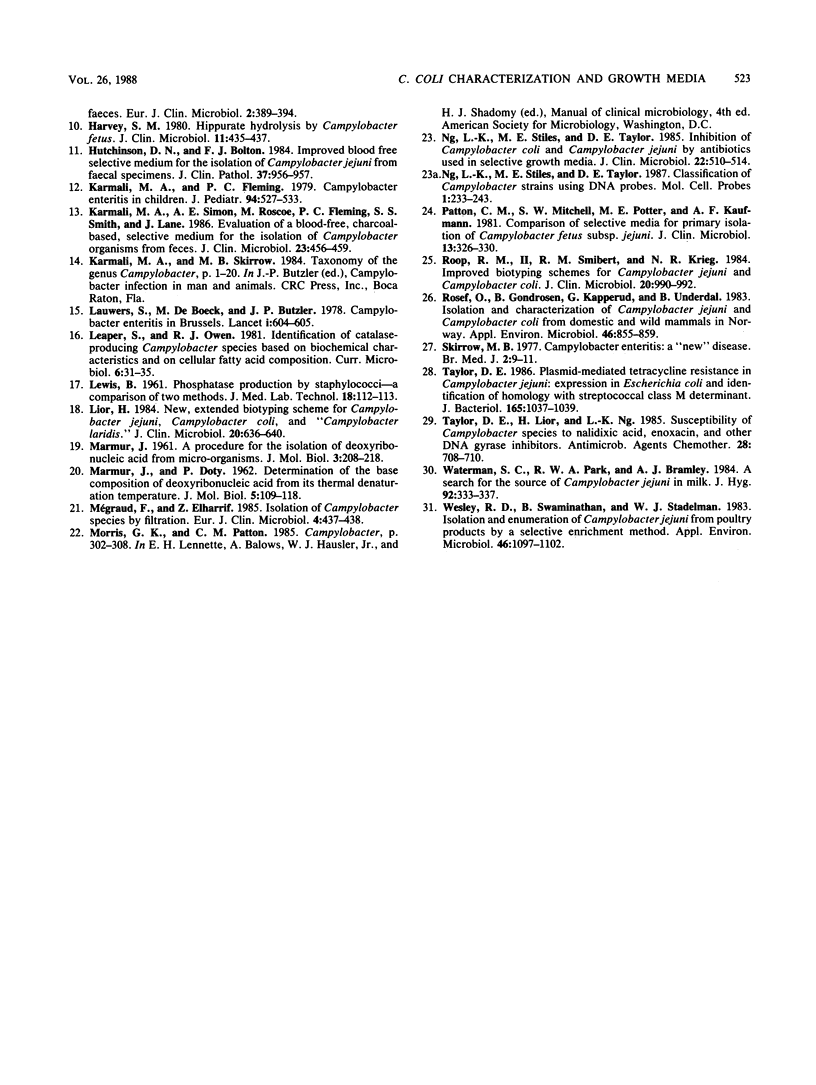
Selected References
These references are in PubMed. This may not be the complete list of references from this article.
- Birnboim H. C., Doly J. A rapid alkaline extraction procedure for screening recombinant plasmid DNA. Nucleic Acids Res. 1979 Nov 24;7(6):1513–1523. doi: 10.1093/nar/7.6.1513. [DOI] [PMC free article] [PubMed] [Google Scholar]
- Blaser M. J., Berkowitz I. D., LaForce F. M., Cravens J., Reller L. B., Wang W. L. Campylobacter enteritis: clinical and epidemiologic features. Ann Intern Med. 1979 Aug;91(2):179–185. doi: 10.7326/0003-4819-91-2-179. [DOI] [PubMed] [Google Scholar]
- Brooks B. W., Garcia M. M., Fraser D. E., Lior H., Stewart R. B., Lammerding A. M. Isolation and characterization of cephalothin-susceptible Campylobacter coli from slaughter cattle. J Clin Microbiol. 1986 Oct;24(4):591–595. doi: 10.1128/jcm.24.4.591-595.1986. [DOI] [PMC free article] [PubMed] [Google Scholar]
- Christensen W. B. Urea Decomposition as a Means of Differentiating Proteus and Paracolon Cultures from Each Other and from Salmonella and Shigella Types. J Bacteriol. 1946 Oct;52(4):461–466. doi: 10.1128/jb.52.4.461-466.1946. [DOI] [PMC free article] [PubMed] [Google Scholar]
- Davies J., Smith D. I. Plasmid-determined resistance to antimicrobial agents. Annu Rev Microbiol. 1978;32:469–518. doi: 10.1146/annurev.mi.32.100178.002345. [DOI] [PubMed] [Google Scholar]
- Dekeyser P., Gossuin-Detrain M., Butzler J. P., Sternon J. Acute enteritis due to related vibrio: first positive stool cultures. J Infect Dis. 1972 Apr;125(4):390–392. doi: 10.1093/infdis/125.4.390. [DOI] [PubMed] [Google Scholar]
- Gebhart C. J., Edmonds P., Ward G. E., Kurtz H. J., Brenner D. J. "Campylobacter hyointestinalis" sp. nov.: a new species of Campylobacter found in the intestines of pigs and other animals. J Clin Microbiol. 1985 May;21(5):715–720. doi: 10.1128/jcm.21.5.715-720.1985. [DOI] [PMC free article] [PubMed] [Google Scholar]
- Goossens H., De Boeck M., Butzler J. P. A new selective medium for the isolation of Campylobacter jejuni from human faeces. Eur J Clin Microbiol. 1983 Aug;2(4):389–393. doi: 10.1007/BF02019476. [DOI] [PubMed] [Google Scholar]
- Harvey S. M. Hippurate hydrolysis by Campylobacter fetus. J Clin Microbiol. 1980 Apr;11(4):435–437. doi: 10.1128/jcm.11.4.435-437.1980. [DOI] [PMC free article] [PubMed] [Google Scholar]
- Hutchinson D. N., Bolton F. J. Improved blood free selective medium for the isolation of campylobacter jejuni from faecal specimens. J Clin Pathol. 1984 Aug;37(8):956–957. doi: 10.1136/jcp.37.8.956-b. [DOI] [PMC free article] [PubMed] [Google Scholar]
- Karmali M. A., Fleming P. C. Campylobacter enteritis in children. J Pediatr. 1979 Apr;94(4):527–533. doi: 10.1016/s0022-3476(79)80004-9. [DOI] [PubMed] [Google Scholar]
- Karmali M. A., Simor A. E., Roscoe M., Fleming P. C., Smith S. S., Lane J. Evaluation of a blood-free, charcoal-based, selective medium for the isolation of Campylobacter organisms from feces. J Clin Microbiol. 1986 Mar;23(3):456–459. doi: 10.1128/jcm.23.3.456-459.1986. [DOI] [PMC free article] [PubMed] [Google Scholar]
- LEWIS B. Phosphatase production by staphylococci--a comparison of two methods. J Med Lab Technol. 1961 Apr;18:112–113. [PubMed] [Google Scholar]
- Lauwers S., De Boeck M., Butzler J. P. Campylobacter enteritis in Brussels. Lancet. 1978 Mar 18;1(8064):604–605. doi: 10.1016/s0140-6736(78)91045-0. [DOI] [PubMed] [Google Scholar]
- Lior H. New, extended biotyping scheme for Campylobacter jejuni, Campylobacter coli, and "Campylobacter laridis". J Clin Microbiol. 1984 Oct;20(4):636–640. doi: 10.1128/jcm.20.4.636-640.1984. [DOI] [PMC free article] [PubMed] [Google Scholar]
- MARMUR J., DOTY P. Determination of the base composition of deoxyribonucleic acid from its thermal denaturation temperature. J Mol Biol. 1962 Jul;5:109–118. doi: 10.1016/s0022-2836(62)80066-7. [DOI] [PubMed] [Google Scholar]
- Mégraud F., Elharrif Z. Isolation of Campylobacter species by filtration. Eur J Clin Microbiol. 1985 Aug;4(4):437–438. doi: 10.1007/BF02148709. [DOI] [PubMed] [Google Scholar]
- Ng L. K., Stiles M. E., Taylor D. E. Classification of Campylobacter strains using DNA probes. Mol Cell Probes. 1987 Sep;1(3):233–243. doi: 10.1016/0890-8508(87)90036-3. [DOI] [PubMed] [Google Scholar]
- Ng L. K., Stiles M. E., Taylor D. E. Inhibition of Campylobacter coli and Campylobacter jejuni by antibiotics used in selective growth media. J Clin Microbiol. 1985 Oct;22(4):510–514. doi: 10.1128/jcm.22.4.510-514.1985. [DOI] [PMC free article] [PubMed] [Google Scholar]
- Patton C. M., Mitchell S. W., Potter M. E., Kaufmann A. F. Comparison of selective media for primary isolation of Campylobacter fetus subsp. jejuni. J Clin Microbiol. 1981 Feb;13(2):326–330. doi: 10.1128/jcm.13.2.326-330.1981. [DOI] [PMC free article] [PubMed] [Google Scholar]
- Roop R. M., 2nd, Smibert R. M., Krieg N. R. Improved biotyping schemes for Campylobacter jejuni and Campylobacter coli. J Clin Microbiol. 1984 Nov;20(5):990–992. doi: 10.1128/jcm.20.5.990-992.1984. [DOI] [PMC free article] [PubMed] [Google Scholar]
- Rosef O., Gondrosen B., Kapperud G., Underdal B. Isolation and characterization of Campylobacter jejuni and Campylobacter coli from domestic and wild mammals in Norway. Appl Environ Microbiol. 1983 Oct;46(4):855–859. doi: 10.1128/aem.46.4.855-859.1983. [DOI] [PMC free article] [PubMed] [Google Scholar]
- Skirrow M. B. Campylobacter enteritis: a "new" disease. Br Med J. 1977 Jul 2;2(6078):9–11. doi: 10.1136/bmj.2.6078.9. [DOI] [PMC free article] [PubMed] [Google Scholar]
- Taylor D. E., Ng L. K., Lior H. Susceptibility of Campylobacter species to nalidixic acid, enoxacin, and other DNA gyrase inhibitors. Antimicrob Agents Chemother. 1985 Nov;28(5):708–710. doi: 10.1128/aac.28.5.708. [DOI] [PMC free article] [PubMed] [Google Scholar]
- Taylor D. E. Plasmid-mediated tetracycline resistance in Campylobacter jejuni: expression in Escherichia coli and identification of homology with streptococcal class M determinant. J Bacteriol. 1986 Mar;165(3):1037–1039. doi: 10.1128/jb.165.3.1037-1039.1986. [DOI] [PMC free article] [PubMed] [Google Scholar]
- Waterman S. C., Park R. W., Bramley A. J. A search for the source of Campylobacter jejuni in milk. J Hyg (Lond) 1984 Oct;93(2):333–337. doi: 10.1017/s0022172400064871. [DOI] [PMC free article] [PubMed] [Google Scholar]
- Wesley R. D., Swaminathan B., Stadelman W. J. Isolation and enumeration of Campylobacter jejuni from poultry products by a selective enrichment method. Appl Environ Microbiol. 1983 Nov;46(5):1097–1102. doi: 10.1128/aem.46.5.1097-1102.1983. [DOI] [PMC free article] [PubMed] [Google Scholar]


